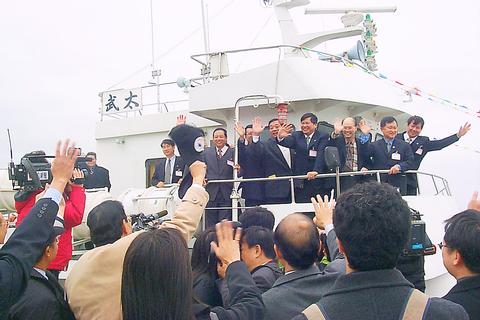Ten Taiwanese businessmen, residents of Taiwan proper, yesterday afternoon sailed direct from Kinmen to Xiamen, on China's east coast, the first time an exception had been made to the regulation that direct cross-strait trips may only be made by residents of Kinmen under the provisions of the "small three links" (小三通) policy.
"The voyage was approved as a special case. The purpose is to enable Taiwanese businessmen to experience the effects of the policy for themselves. If this trial run works, the government will consider further relaxing the policy (

PHOTO: WU CHENG-TING, TAIPEI TIMES
Brushing aside concerns about whether the government would lift the restriction on cross-strait passenger transit via Kinmen, Tsai said that she hoped the small three links policy would mark an end to cross-strait confrontation and a new beginning for peaceful co-existence and co-prosperity.
Deputy Secretary-General of the Straits Exchange Foundation (SEF,
"If the interaction between both sides of the Strait is benign, [the government] is likely to modify the restrictions," Yen said, adding that he believed that all Taiwanese residents should be able to enter China via the outlying island groups of Kinmen and Matsu.
Under the small three links policy, however, only Kinmen and Matsu residents whose households have been registered in Kinmen or Matsu for over six months are allowed to apply for permits to enter China from Kinmen.
At yesterday's Chinese New Year gathering, New Party lawmaker Lee Chu-feng (
Such cross-strait trips, however, require approval from the governments of both sides. The Chinese authorities seem to be more welcoming of Taiwanese businessmen than of private Taiwanese citizens.
"It should be easier for Taiwanese businessmen [than for private citizens] to get approval [from China] to enter Xiamen," director of Xiamen city government Yang Lipo (
The businessmen, whose voyage was approved by both Taiwan's MAC and Fujian Province's Taiwan Affairs Office (TAO), arrived in Xiamen at around 3pm yesterday. Xiamen's TAO and its city government held a dinner banquet to welcome the businessmen, who included Huang Tieh-jung (
Vice-chairman of the SEF, Shi Hwei-yow (
"The success of the voyage shows that [cross-strait] links can be established even without conducting negotiations beforehand, although this case is exceptional," Shi said, adding that he believed cross-straits talks were still needed to consolidate the policy.
Tsai said that Taiwan and China should increase economic exchange and cooperation, and gradually expand constructive interaction to other fields since the two sides will soon be admitted to the WTO.
"The WTO accession is expected to provide a framework and common regulations for wide-ranging cross-strait commercial exchanges and cooperation, and facilitate the establishment of a new formula for bilateral engagement," Tsai added.

AGING: As of last month, people aged 65 or older accounted for 20.06 percent of the total population and the number of couples who got married fell by 18,685 from 2024 Taiwan has surpassed South Korea as the country least willing to have children, with an annual crude birthrate of 4.62 per 1,000 people, Ministry of the Interior data showed yesterday. The nation was previously ranked the second-lowest country in terms of total fertility rate, or the average number of children a woman has in her lifetime. However, South Korea’s fertility rate began to recover from 2023, with total fertility rate rising from 0.72 and estimated to reach 0.82 to 0.85 by last year, and the crude birthrate projected at 6.7 per 1,000 people. Japan’s crude birthrate was projected to fall below six,

US President Donald Trump in an interview with the New York Times published on Thursday said that “it’s up to” Chinese President Xi Jinping (習近平) what China does on Taiwan, but that he would be “very unhappy” with a change in the “status quo.” “He [Xi] considers it to be a part of China, and that’s up to him what he’s going to be doing, but I’ve expressed to him that I would be very unhappy if he did that, and I don’t think he’ll do that. I hope he doesn’t do that,” Trump said. Trump made the comments in the context

SELF-DEFENSE: Tokyo has accelerated its spending goal and its defense minister said the nation needs to discuss whether it should develop nuclear-powered submarines China is ramping up objections to what it sees as Japan’s desire to acquire nuclear weapons, despite Tokyo’s longstanding renunciation of such arms, deepening another fissure in the two neighbors’ increasingly tense ties. In what appears to be a concerted effort, China’s foreign and defense ministries issued statements on Thursday condemning alleged remilitarism efforts by Tokyo. The remarks came as two of the country’s top think tanks jointly issued a 29-page report framing actions by “right-wing forces” in Japan as posing a “serious threat” to world peace. While that report did not define “right-wing forces,” the Chinese Ministry of Foreign Affairs was

PREPAREDNESS: Given the difficulty of importing ammunition during wartime, the Ministry of National Defense said it would prioritize ‘coproduction’ partnerships A newly formed unit of the Marine Corps tasked with land-based security operations has recently replaced its aging, domestically produced rifles with more advanced, US-made M4A1 rifles, a source said yesterday. The unnamed source familiar with the matter said the First Security Battalion of the Marine Corps’ Air Defense and Base Guard Group has replaced its older T65K2 rifles, which have been in service since the late 1980s, with the newly received M4A1s. The source did not say exactly when the upgrade took place or how many M4A1s were issued to the battalion. The confirmation came after Chinese-language media reported